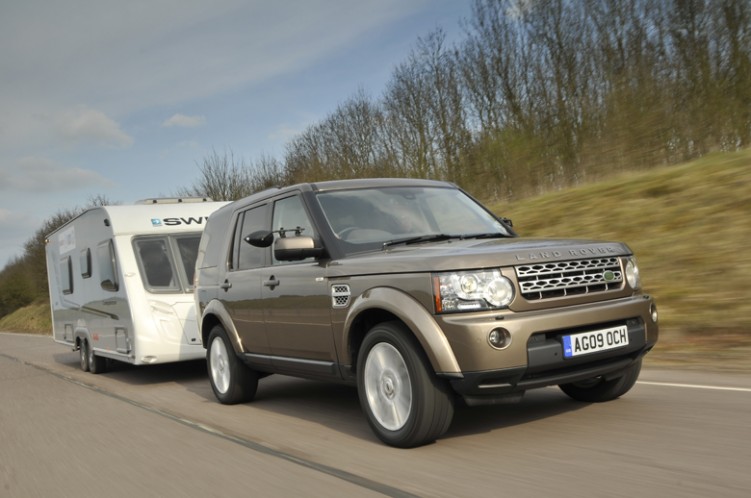


This is the third time in four years the Land Rover Discovery has won the heavyweight class, and this year’s victory is its most emphatic.
The new Discovery 4 has preserved all that was good about the old Discovery 3, but has fixed its few flaws. The 3.0-litre engine delivers a much-improved performance and its revised suspension preserves the pillowy ride but now combines this with more precise handling.
It took just 12 seconds for the Discovery to tow from 30-60mph pulling a heavily loaded twin-axle tourer. That’s 5.2 seconds less than the old model needed to do it last year.
In spite of the engine’s extra power and torque, it’s hushed and quiet even when accelerating hard.
The lane-change test used to be a weakness for the Discovery, certainly compared with some German 4x4s such as the Audi Q7. This year the big Land Rover was more settled through the cones. Meatier, more direct steering helped the driver place car and caravan exactly where intended. Even at 35mph there was less roll than before and the caravan followed behind like a well-trained pet.
Stopping over four-and-a-half tonnes of car and caravan demands powerful brakes, and the Land Rover delivers, stopping from 30mph in just 10.6 metres. When you’re in less of a rush, it’s easy to slow the outfit down smoothly.
The hill-start test has never caused the Discovery any trouble. The electronic parking brake held the outfit, then released smoothly allowing car and caravan a fuss-free drive to the top of the slope.
The Discovery has always been an enjoyable car to travel in, thanks to plentiful space for seven and a cosseting ride. It’s now a more enjoyable car to drive, too. Leave the caravan behind and you really notice the extra speed and the more composed cornering.
The huge boot, full-size spare and self-levelling suspension ticked all the right boxes for our practicality judge, and resale values of 45% after three years soften the blow of the high price.
It’s not supposed to be easy choosing the best from 40-odd cars. This year, however, the discussion was a short one.
The Land Rover Discovery 4 is an exceptional car. The old model was one of our favourite tow cars, but the new Discovery improves upon it in just about every area.
It’s hard to say whether the 3.0-litre engine or the superb ride and handling deserve top billing. The new engine has more power and torque than the old 2.7, and it’s more economical, too. Hitch up a two-tonne tourer to the old model, and the engine pulls with determination rather than vigour. Attach the same caravan to the Discovery 4 and it gains speed just as quickly as its German rivals such as the Audi Q7.
It’s more composed if you want to change direction in a hurry, too. There’s less roll than before and more direct steering. The hint of vagueness has gone, which gives the driver more confidence to press on.
The lane-change test highlighted the Discovery’s limitations in previous years. In 2010, though, the Land Rover was a match for any of its rivals. Even at high speeds the caravan never unsettled the back of the car.
What’s really clever is that Land Rover has made these improvements without ruining the Discovery’s ride. Take life at a steady place and the cabin of the Discovery remains one of the most comfortable places on four wheels. Bumps that are felt with a jolt and heard with a thump in stiffly sprung SUVs seem to disappear beneath the Land Rover’s tyres.
Along with the lane-change test, the hill start is where many cars came unstuck. Not the Discovery. The electronic brake held the outfit still first time, every time. We know there are those who can’t see anything wrong with a conventional handbrake, but the best electronic brakes do make stopping and starting on a steep slope so simple and stress-free. The combination of four-wheel drive and that barrel-chested engine pulled it to the top of the 1-in-6 test hill with ease. In fact, the Discovery made this test seem so easy that some of the judges tried the Land Rover on a 1-in-4 slope. The result was the same.
Most cars picked up far lower scores for practicality than for towing, a sign that manufacturers really need to think harder about tow car drivers’ needs. Land Rover leads the way, though. With its full-size spare, self-levelling suspension, Trailer Stability Programme, huge boot and many more practical features, the Discovery ticks more boxes than just about any other car.
You’ll be just as happy with the Discovery when you are not towing. The same improvements that make it a quicker, more composed tow car are still apparent in normal driving. It’s just as pleasant to travel in as before, but now it’s considerably more fun.
Our biggest reservation with the Land Rover is its price. Costing more than £40,000, we know that this won’t be the tow car for everyone. However, resale values of 45% soften the blow, and there are plenty of other award-winners which are easier on your bank balance.
It’s the best car in this year’s tests by some margin, and a more than worthy overall champion.